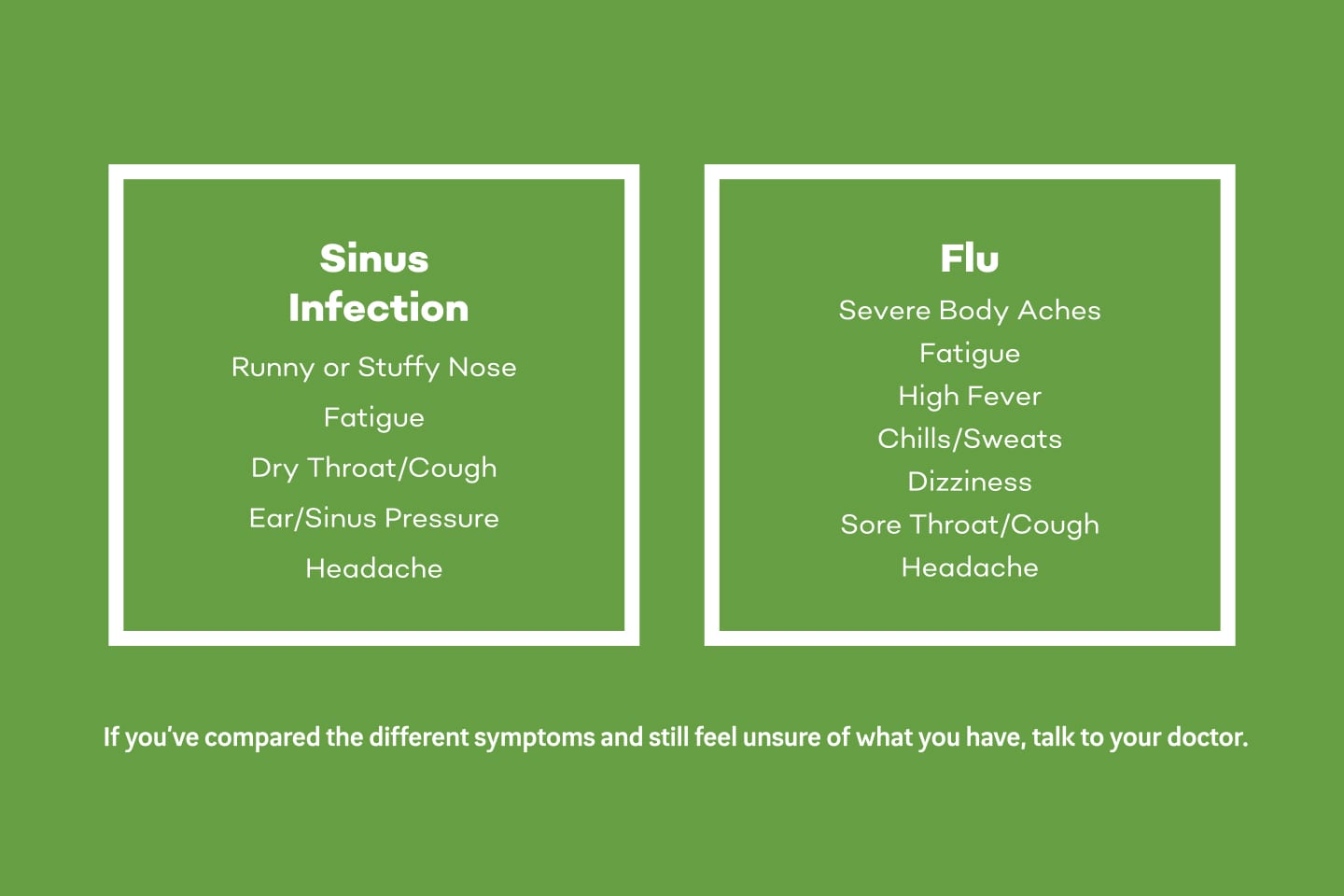5 Common Questions, Answered
Sinus infections are an incredibly common condition – especially during changing seasons and colder months. Many people just accept that stuffy noses and headaches are part of their body’s winter routine, but there are ways to treat them and lower your risk of sinus infections in the future. Here, we answer five common questions about sinus infections and offer some advice on what to do the next time your nose becomes a nuisance.
By Anna Hill



TN/NC Medical Director,
AFC Urgent Care
What exactly is a sinus infection?
A sinus infection – also known as sinusitis – is when the tissue lining your sinuses becomes swollen or inflamed. When sinuses are healthy, air flows through them and fills them easily. However, when they’re inflamed, they become blocked and fill with mucus that allows germs and bacteria to develop. “Once that overgrowth of bacteria takes place, the bacterial sinus infection starts,” Dr. Sue Gouge, a family physician at Galen Mountain View Medicine, explains. This sinus blockage can be caused by many different things, including the common cold, allergies, nasal polyps (small growths in the lining of the nose), or a deviated septum. You might be at a higher risk of developing a sinus infection if you have a medical condition such as cystic fibrosis or HIV/AIDS, or if you’re regularly exposed to smoke, whether that be from smoking, being exposed to secondhand smoke, or inhaling smoke regularly in a work setting.
The most common symptoms of a sinus infection include thick, yellow or yellow-green discharge from the nose or down the back of the throat; nasal blockage or significant nasal congestion, which can cause difficulty breathing; and discomfort, tenderness, or swelling around the nose, forehead, eyes, or cheeks, which might worsen when you bend over. Other signs include ear pressure, headaches, loss of smell, cough, fatigue, and fever, many of which are symptoms of a cold, which is the most common cause of a sinus infection.



Nurse Practitioner,
Parkridge Medical Group – Southside
How do I know it’s not something else, like the flu?
While allergies and the common cold often lead to a sinus infection and share many symptoms with it, more serious viral infections like the flu have some signs that set them apart. The flu is usually accompanied by severe full-body aches and fatigue, a high fever, chills, dizziness, a sore throat, dry cough, and headache. While sinus infections can cause symptoms of fatigue, headache, and sore throat, a sinus infection is not accompanied by full-body aches, a high fever, or chills. Covid-19 also comes with very similar symptoms to sinus infection such as a fever, coughs, a headache and congestion. Furthermore, most symptoms of a sinus infection involve the nasal passages. Lisa Brooks, a nurse practitioner with Parkridge Medical Group – Southside, indicates that sinus-specific symptoms are key to discerning what you’re suffering from. “Sinus infections can have many symptoms, such as a low fever or sore throat, but the defining indicator is yellow-green discharge from the nasal passages as well as facial pain,” she explains. If you have concerns that you may be experiencing symptoms of Covid-19, then contact your primary care doctor immediately.





Family Physician,
Galen Mountain View Medicine
Sinus Infection
- Runny or Stuffy Nose
- Fatigue
- Dry Throat/Cough
- Ear/Sinus Pressure
- Headache
Flu
- Severe Body Aches
- Fatigue
- High Fever
- Chills/Sweats
- Dizziness
- Sore Throat/Cough
- Headache
If you’ve compared the different symptoms and still feel unsure of what you have, talk to your doctor.
How do I treat a sinus infection at home?
Though the symptoms can certainly be bothersome – everyone hates having a blocked nose – a sinus infection often resolves itself. There are many over-the-counter treatments, such as nasal decongestants, nasal corticosteroids (sprays designed to prevent or treat nasal inflammation), saline nasal washes or sprays, and pain relievers/fever reducers such as acetaminophen or ibuprofen, which can be used to relieve headaches caused by sinus pressure. If allergies are what’s causing your sinuses to be inflamed, an antihistamine might be recommended. Another at-home method to ease your symptoms is warm, moist air, which you can get by using a vaporizer or taking a hot shower. Dr. Todd Rudolph, medical director at AFC Urgent Care, advises the use of strong decongestants to clear up your symptoms. “Decongestants such as Mucinex help to break up the mucus, making it easier to be expelled via coughing or blowing your nose,” he explains.



How do I know when to see a doctor?
Your body can usually heal a sinus infection on its own. “Antibiotics are not generally needed for sinus infections to improve. You should give your body’s immune system time to fight off the infection,” Brooks says. Furthermore, some prescribed treatments, such as antibiotics, are preferred to be used by doctors only as a last resort. “We want to avoid prescribing antibiotics as much as possible to reduce the chances of the patient becoming resistant to the antibiotics,” explains Dr. Gouge. Unfortunately, some sinus infections end up being too severe to simply resolve themselves over time, even with over-the-counter treatments. It’s time to see a doctor if you experience any of the following:
- Symptoms that last longer than 10 days
- Symptoms that worsen after initially improving
- A persistent fever
- A history of recurring or chronic sinusitis
Furthermore, if more severe symptoms develop, such as a high fever, acute pain or swelling around the eyes, confusion, changes in vision, or a stiff neck, see a doctor immediately, as these may be signs of a more serious infection.
If your symptoms persist in spite of over-the-counter medications, your doctor might prescribe steroids or antibiotics, which will resolve swelling and infection. If allergies are the culprit of your sinus infection or recurring sinusitis, your doctor might recommend allergy shots to target the problem at its source. In some rare cases, those who are at higher risk of sinus infection or experience frequent sinus infections might be given antibodies, which helps your body compensate for immune deficiencies.
What can I do to prevent a sinus infection?
While there is currently no guaranteed way to prevent sinus infections, there are several measures you can take to lower your risk. Frequent handwashing and maintaining your distance from anyone who has a cold is a must. While sinus infections on their own aren’t contagious, they’re often caused by colds – a viral infection that is. Another way to avoid sinus infections is to be aware of your allergies and manage them effectively. “Regular use of nasal saline and sinus rinses are effective in removing allergens, as well as many viruses that can activate the immune system,” advises Dr. Rudolph.
Refraining from smoking or placing yourself in scenarios where you inhale smoke regularly is good advice all-round, and especially important when it comes to maintaining your respiratory health. If you live in a dry climate or environment, consider investing in a humidifier for your home, as adding moisture to the air may help to prevent nasal irritation, which can lead to sinus infections.
Sinus infections, though annoying, are easy to treat, and there are steps you can take to prevent them. Wash your hands frequently, let your body get good rest, and avoid known allergens to keep your sinuses clear and healthy. HS

